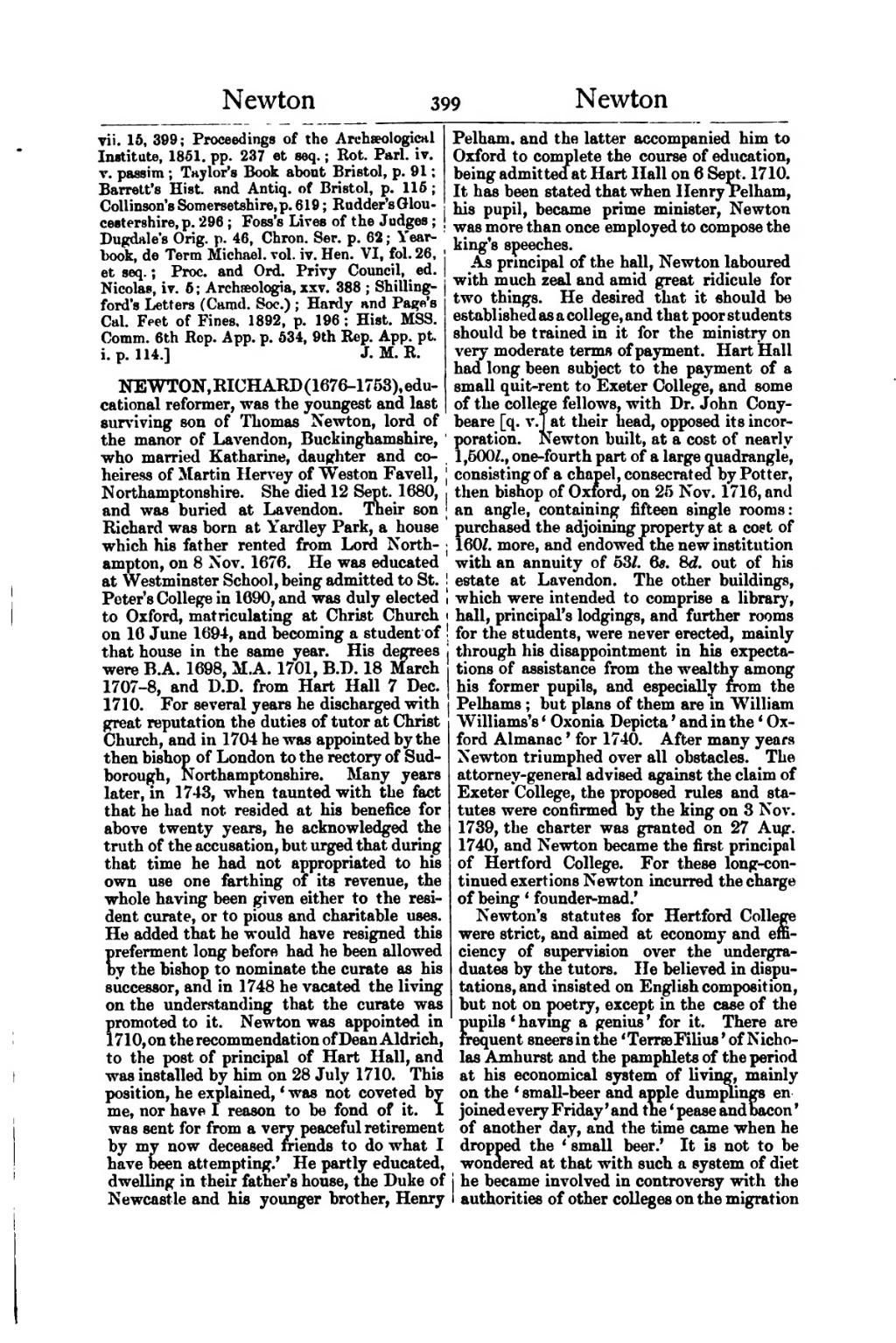vii. 15, 399; Proceedings of the Archæological Institute, 1851, pp. 237 et seq.; Rot. Parl. iv. v. passim; Taylor's Book about Bristol, p. 91; Barrett's Hist. and Antiq. of Bristol, p. 115; Collinson's Somersetshire, p. 619; Rudder's Gloucestershire, p. 296; Foss's Lives of the Judges; Dugdale's Orig. p. 46, Chron. Ser. p. 62; Year-book, de Term Michael. vol. iv. Hen. VI, fol. 26, et seq.; Proc. and Ord. Privy Council, ed. Nicolas, iv. 5; Archæologia, xxv. 388; Shillingford's Letters (Camd. Soc.); Hardy and Page's Cal. Feet of Fines, 1892, p. 196; Hist. MSS. Comm. 6th Rep. App. p. 534, 9th Rep. App. pt. i. p. 114.]
NEWTON, RICHARD (1676–1753), educational reformer, was the youngest and last surviving son of Thomas Newton, lord of the manor of Lavendon, Buckinghamshire, who married Katharine, daughter and coheiress of Martin Hervey of Weston Favell, Northamptonshire. She died 12 Sept. 1680, and was buried at Lavendon. Their son Richard was born at Yardley Park, a house which his father rented from Lord Northampton, on 8 Nov. 1676. He was educated at Westminster School, being admitted to St. Peter's College in 1690, and was duly elected to Oxford, matriculating at Christ Church on 16 June 1694, and becoming a student of that house in the same year. His degrees were B.A. 1698, M.A. 1701, B.D. 18 March 1707–8, and D.D. from Hart Hall 7 Dec. 1710. For several years he discharged with great reputation the duties of tutor at Christ Church, and in 1704 he was appointed by the then bishop of London to the rectory of Sudborough, Northamptonshire. Many years later, in 1743, when taunted with the fact that he had not resided at his benefice for above twenty years, he acknowledged the truth of the accusation, but urged that during that time he had not appropriated to his own use one farthing of its revenue, the whole having been given either to the resident curate, or to pious and charitable uses. He added that he would have resigned this preferment long before had he been allowed by the bishop to nominate the curate as his successor, and in 1748 he vacated the living on the understanding that the curate was promoted to it. Newton was appointed in 1710, on the recommendation of Dean Aldrich, to the post of principal of Hart Hall, and was installed by him on 28 July 1710. This position, he explained, ‘was not coveted by me, nor have I reason to be fond of it. I was sent for from a very peaceful retirement by my now deceased friends to do what I have been attempting.’ He partly educated, dwelling in their father's house, the Duke of Newcastle and his younger brother, Henry Pelham, and the latter accompanied him to Oxford to complete the course of education, being admitted at Hart Hall on 6 Sept. 1710. It has been stated that when Henry Pelham, his pupil, became prime minister, Newton was more than once employed to compose the king's speeches.
As principal of the hall, Newton laboured with much zeal and amid great ridicule for two things. He desired that it should be established as a college, and that poor students should be trained in it for the ministry on very moderate terms of payment. Hart Hall had long been subject to the payment of a small quit-rent to Exeter College, and some of the college fellows, with Dr. John Conybeare [q. v.] at their head, opposed its incorporation. Newton built, at a cost of nearly 1,500l., one-fourth part of a large quadrangle, consisting of a chapel, consecrated by Potter, then bishop of Oxford, on 25 Nov. 1716, and an angle, containing fifteen single rooms; purchased the adjoining property at a cost of 160l. more, and endowed the new institution with an annuity of 53l. 6s. 8d. out of his estate at Lavendon. The other buildings, which were intended to comprise a library, hall, principal's lodgings, and further rooms for the students, were never erected, mainly through his disappointment in his expectations of assistance from the wealthy among his former pupils, and especially from the Pelhams; but plans of them are in William Williams's ‘Oxonia Depicta’ and in the ‘Oxford Almanac’ for 1740. After many years Newton triumphed over all obstacles. The attorney-general advised against the claim of Exeter College, the proposed rules and statutes were confirmed by the king on 3 Nov. 1739, the charter was granted on 27 Aug. 1740, and Newton became the first principal of Hertford College. For these long-continued exertions Newton incurred the charge of being ‘founder-mad.’
Newton's statutes for Hertford College were strict, and aimed at economy and efficiency of supervision over the undergraduates by the tutors. He believed in disputations, and insisted on English composition, but not on poetry, except in the case of the pupils ‘having a genius’ for it. There are frequent sneers in the ‘Terræ Filius’ of Nicholas Amhurst and the pamphlets of the period at his economical system of living, mainly on the ‘small-beer and apple dumplings enjoined every Friday’ and the ‘pease and bacon’ of another day, and the time came when he dropped the ‘small beer.’ It is not to be wondered at that with such a system of diet he became involved in controversy with the authorities of other colleges on the migration
